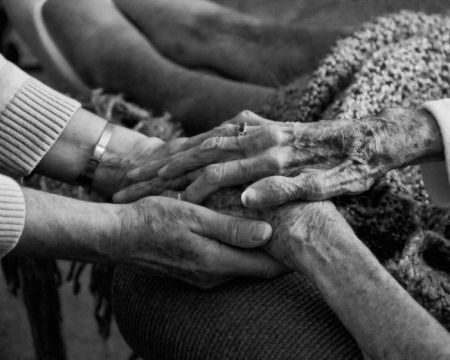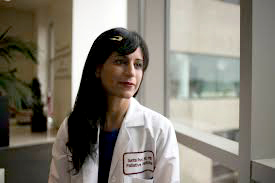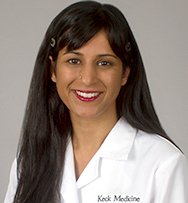 Credit: Stock Photo[/caption]
Credit: Stock Photo[/caption]
With this project, we aim to provide a caring, positive experience for terminal patients whereby they feel valued, honored, and—in the words of the USC Norris Cancer Center—“known.” We hope to provide patients a way to process their situation, plus an opportunity to pass on wisdom or impressions of this period in their lives.
I, on behalf of Samy’s Camera Outreach, will provide a photo shoot for interested patients and their families, resulting in a leather-bound album of images that bolsters self-image, honors their journey, and gives loved ones lasting memories to treasure.
 Dr. Puri was kind enough to discuss the project:
Dr. Puri was kind enough to discuss the project:
Q: Would you classify this collaboration as ‘legacy work’? Can you talk about what you think this project will offer your patients?
I definitely think that this project is a type of legacy work. I often observe patients and their loved ones looking for meaning and for ways to reflect on their lives together and the importance of their relationships. This project offers interested patients a way to think about how, visually speaking, they want to be remembered by people they love. This involves a fair amount of autonomy, which many patients lose during their disease course. They didn't choose their disease or the way it affects them, but they do get to choose whether they want to be photographed in a particular way, in a particular outfit, with a certain person or group of people. They also get to think about who they would like to keep these photographs, and how they would like their loved ones to remember them. Legacy work offers us a way to think about who we are, what we mean and to whom, and how our image of ourselves can be rendered artistically to those we love. In addition to the reflection that precedes the actual photograph session, patients also get a beautiful set of photos that they and their families can use in a way that honors them.
Q: There’s a quote from Aaron Siskind I love: “Photography is a way of feeling, of touching, of loving. What you have caught is captured forever.” I feel our project will offer patients the gift of presence, of being seen, but also a means to create a lasting physical memory. Would you agree with this assessment? What do you think photography uniquely offers end-of-life patients?
Photography is such a powerful visual tool for remembrance. We take photographs throughout life, but when people get really sick, sometimes the ways their disease or its treatment affects their body causes them to shy away from taking photographs. They might feel ashamed of how they look after treatment or because of the way illness has reshaped their body. They might not be able to wear the clothes they would like to wear for portraits. But we seek to make this project fun and fulfilling, and patients can choose to take whatever types of photographs call to them. Some patients might, for example, want to take portraits only of their hands, because they consider their hands to be the most beautiful part of them and a part that has not been touched by their disease. Others might view this opportunity as a way to reclaim their bodies, dress up, and have fun with family and friends while taking group pictures. Sometimes, fatigue and immobility might limit the photographs to portraits only of their face. Others might want to focus only on the battle scars from their treatments, using the photographs to capture and remember the extent to which they have sought treatment at any cost. But no matter what the patient's situation, the project offers a way for patients and families to be seen and celebrated in a way that is most comfortable and healing for them. It offers patients a way of documenting their last stages of life the way that we all now document every stage of life - with beautiful photographs.
Q: Do you see a rise in legacy work being done with hospice patients?
There is a growing recognition that patients with advanced illness have concerns beyond physical symptoms. Such a large part of my conversations with patients involves listening to their own reflections about the meaning of their lives and the way they want to be remembered. This is the powerful place of legacy work: it offers patients the opportunity to think about and enact the ways they want to be remembered, often through the use of art. Legacy projects can include letter writing to loved ones, audio recordings, drawings or paintings, and of course portraits and photography. These modalities, which go far beyond medicine, allow people to make peace with and celebrate their lives in a tangible way that is also a gift to their loved ones. I have even found that sometimes engaging patients in legacy work can improve their emotional experience and overall wellbeing - potentially even their experience of physical symptoms. I do hope that the opportunity to engage in legacy work will continue to grow in hospice but also well beyond patients in hospice care. I should note, though, that for some patients legacy work can be triggering and overwhelming, so I always normalize for patients the possibility that legacy work may not be helpful or appealing to everyone. Each of our experiences with advanced illness is unique and complex, and should be handled accordingly.
Q: How does doing legacy work with your patients affect your job? Does it make your job more fulfilling, for example? Harder or easier emotionally?
Legacy work is incredibly fulfilling to do because it allows me to attend to the spiritual and emotional well-being of my patients. Palliative medicine is a field that attends not only to physical symptoms, but also to emotional and spiritual symptoms. Offering patients an artistic way of exploring and expressing how they want to be remembered helps me to care more holistically for them, but is also an honor and a privilege to facilitate and witness. When I ask patients if they would like to participate in our photography project, I get to hear from them how they would want to dress up for the portraits, who they would want to be in the portraits, what kind of photographs they want to take (silly ones, serious ones, a combination of both), and who they would want to look at the portraits long after they have left their bodies. It doesn't make the job harder or easier, but simply richer. I learn so much about who my patient is, who they love, and who they will miss and worry about simply by hearing them talk through their plans for the photography session. This knowledge, in turn, helps our whole palliative medicine team (including our social worker and chaplain) to attend more deeply to our patients' unique needs.
 As a clinician-educator, Dr. Puri believes that teaching palliative medicine across all medical disciplines and levels is essential to meet the growing need for palliative care in our country. As a member of Keck Hospital’s Ethics Committee, Dr. Puri teaches Advanced Clinical Ethics to second-year medical students. Dr. Puri also writes creative nonfiction, with work appearing in the New York Times, Journal of the American Medical Association, and Slate. Her first book, a memoir examining her personal path to and professional experience practicing palliative medicine, will be published by Viking in 2018.
As a clinician-educator, Dr. Puri believes that teaching palliative medicine across all medical disciplines and levels is essential to meet the growing need for palliative care in our country. As a member of Keck Hospital’s Ethics Committee, Dr. Puri teaches Advanced Clinical Ethics to second-year medical students. Dr. Puri also writes creative nonfiction, with work appearing in the New York Times, Journal of the American Medical Association, and Slate. Her first book, a memoir examining her personal path to and professional experience practicing palliative medicine, will be published by Viking in 2018.






